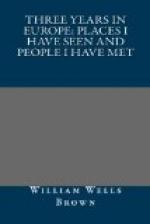After remaining a short time, and reading the epitaphs of the departed, we again returned to “The Knoll.” Nothing can be more imposing than the beauty of English park scenery, and especially in the vicinity of the lakes. Magnificent lawns that extend like sheets of vivid green, with here and there a sprinkling of fine trees, heaping up rich piles of foliage, and then the forests with the hare, the deer, and the rabbit, bounding away to the covert, or the pheasant suddenly bursting upon the wing—the artificial stream, the brook taught to wind in natural meanderings, or expand into the glassy lake, with the yellow leaf sleeping upon its bright waters, and occasionally a rustic temple or sylvan statue grown green and dark with age, give an air of sanctity and picturesque beauty to English scenery that is unknown in the United States. The very labourer with his thatched cottage and narrow slip of ground-plot before the door, the little flower-bed, the woodbine trimmed against the wall, and hanging its blossoms about the windows, and the peasant seen trudging home at nightfall with the avails of the toil of the day upon his back—all this tells us of the happiness both of rich and poor in this country. And yet there are those who would have the world believe that the labourer of England is in a far worse condition than the slaves of America. Such persons know nothing of the real condition of the working classes of this country. At any rate, the poor here, as well as the rich, are upon a level, as far as the laws of the country are concerned. The more one becomes acquainted with the English people, the more one has to admire them. They are so different from the people of our own country. Hospitality, frankness, and good humour, are always to be found in an Englishman. After a ramble of three days about the lakes, we mounted the coach, bidding Miss Martineau farewell, and quitted the lake district.
LETTER XVII.
A Day in the Crystal Palace.
LONDON, June 27th, 1851.
Presuming that you will expect from me some account of the great World’s Fair, I take my pen to give you my own impressions, although I am afraid that anything which I may say about this “Lion of the day,” will fall far short of a description. On Monday last, I quitted my lodgings at an early hour, and started for the Crystal Palace. This day was fine, such as we seldom experience in London, with a clear sky, and invigorating air, whose vitality was as rousing to the spirits as a blast from the “horn of Astolpho.” Although it was not yet 10 o’clock when I entered Piccadilly, every omnibus was full, inside and out, and the street was lined with one living stream, as far as the eye could reach, all wending their way to the “Glass-House.” No metropolis in the world presents such facilities as London for the reception of the Great Exhibition, now collected within its walls. Throughout its myriads of veins, the stream of industry and toil pulses with sleepless energy. Every one seems to feel that this great Capital of the world, is the fittest place wherein they might offer homage to the dignity of toil. I had already begun to feel fatigued by my pedestrian excursion as I passed “Apsley House,” the residence of the Duke of Wellington, and emerged into Hyde Park.




